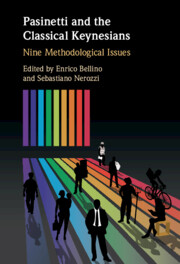Book contents
- Pasinetti and the Classical Keynesians
- Pasinetti and the Classical Keynesians
- Copyright page
- Contents
- Contributors
- Foreword
- Introduction
- 1 Reality (and Not Simply Abstract Rationality) as the Starting Point of Economic Theory
- 2 Economic Logic with Internal Consistency (and Not Only Formal Rigour)
- 3 Malthus and the Classics (Not Walras and the Marginalists) as the Major Inspiring Source in the History of Economic Thought
- 4 Non-ergodic (in Place of Stationary, Timeless) Economic Systems
- 5 Causality vs. Interdependence
- 6 Macroeconomics before Microeconomics
- 7 Disequilibrium and Instability (Not Equilibrium) as the Normal State of the Industrial Economies
- 8 Necessity of Finding an Appropriate Analytical Framework for Dealing with Technical Change and Economic Growth
- 9 A Strong, Deeply Felt, Social Concern
- 10 Why the Classic-Keynesian Trend May Be of Interest to a Young Scholar Today
- 11 Pasinetti’s Separation Theorem
- Author Index
- References
11 - Pasinetti’s Separation Theorem
Published online by Cambridge University Press: 17 February 2022
- Pasinetti and the Classical Keynesians
- Pasinetti and the Classical Keynesians
- Copyright page
- Contents
- Contributors
- Foreword
- Introduction
- 1 Reality (and Not Simply Abstract Rationality) as the Starting Point of Economic Theory
- 2 Economic Logic with Internal Consistency (and Not Only Formal Rigour)
- 3 Malthus and the Classics (Not Walras and the Marginalists) as the Major Inspiring Source in the History of Economic Thought
- 4 Non-ergodic (in Place of Stationary, Timeless) Economic Systems
- 5 Causality vs. Interdependence
- 6 Macroeconomics before Microeconomics
- 7 Disequilibrium and Instability (Not Equilibrium) as the Normal State of the Industrial Economies
- 8 Necessity of Finding an Appropriate Analytical Framework for Dealing with Technical Change and Economic Growth
- 9 A Strong, Deeply Felt, Social Concern
- 10 Why the Classic-Keynesian Trend May Be of Interest to a Young Scholar Today
- 11 Pasinetti’s Separation Theorem
- Author Index
- References
Summary
Cambridge economics can still be seen as a distinctive subdiscipline, involving a revival of classical and Keynesian economics and contributing to macroeconomics, to the theory of growth and distribution, to capital theory and to the history of economic thought. Pasinetti has been a major representative of this school for more than half a century. The present essay is the concluding chapter of a Festschrift for him. It provides a synthesis of the other chapters, which are dedicated to individual aspects of Pasinetti’s contributions to Cambridge economics. It leads from the methodological foundations and the theory of prices, based on production, to the theory of investment under uncertainty and to distribution, to capital theory and to growth with structural change. This is explained with Pasinetti’s normative turn. The formal conditions for the maintenance of full employment in an economy with differential rates of productivity growth in the different sectors have to be separated from the institutions, the legal and ethical rules and the historical conditions that may be required to realise full employment. The exposition is in part critical and concerns shortcomings of neoclassical approaches, and in part constructive.
- Type
- Chapter
- Information
- Pasinetti and the Classical KeynesiansNine Methodological Issues, pp. 290 - 316Publisher: Cambridge University PressPrint publication year: 2022

